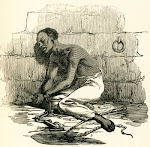 When I moved a few years ago, I was assigned a new telephone number to replace the one I used in the old location--definitely understandable: a new service, a new phone number.
When I moved a few years ago, I was assigned a new telephone number to replace the one I used in the old location--definitely understandable: a new service, a new phone number.But little did I know that the phone number I was given was a recycled one--and, wouldn't you know it, the number belonged to several of what is commonly referred to as "deadbeats."
Bill collectors harassed me night and day for months, which quickly turned into years, and even now, after about five years, I still get a stray call or two for one of the several women who have since moved on, taking their bad credit ratings, but not their harassing phone calls, with them.
As is often our human plight, I, and not those who were being sought, was the one who suffered, as I intercepted all those ill-tempered calls that should have gone to them.
Over time, I got to know all their names, and, using the Internet to probe, and collect valuable intelligence, I found that they all had once lived, or was still living, within my new burg.
For all my inconvenience, it didn't come close, no, Sir, not even by a mile, to the inconvenience that some have suffered, and will suffer, because they now have a new zip code, or a new telephone number, not because they voluntarily moved, but because they found themselves uprooted--ejected from their town, their homes, their church, their golf course, their jobs, and even their zip code, which has also been suspended.
With the closing of the local post office, the zip code 89405 is not currently receiving mail--the mail will, most likely, be forwarded, returned, or given a tiny tombstone in the dead-letter file--perhaps the fate of the town itself.
The End of an Empire, at Least For NowThis state is scarred with remnants of quests to unearth riches beneath the desert.
Scores of Nevada gold- and silver-mining camps boomed momentarily before the ore petered out and the prospectors scattered. Yet, about 100 miles north of Reno, on the edge of the Black Rock Desert Wilderness, the community of Empire worried little about the ephemeral nature of other mining towns.
Theirs had bustled along since the 1920s — when Empire was named for a brand of plaster — and building materials giant U.S. Gypsum Corp. had run things for more than half a century. When Mike Norman was asked on his application in 2006 why he wanted a job here, he wrote: "To be able to work without fear of company closure; have been told this is a great company."
Norman, now 57, and his wife, Barbara, 54, moved from Montana so he could work at USG, the sole reason for Empire's survival. Employees would unearth gypsum at a nearby quarry and truck it to the large yellow plant with rust-colored smokestacks. There, assembly lines churned out plaster and drywall, key components in home construction.
Workers lived in the shadow of the whirring plant, and USG essentially served as mayor, police chief and landlord. Norman did a little bit of everything for the company, including tending to trash and sewers.
Before long, the Normans had woven themselves into the community, where almost everything sat on company land: the two churches, the nine-hole golf course, the store selling hot dogs and DVDs, the two-bedroom apartment that the couple rented for $125 a month. They planned to stay until Mike Norman retired.
They didn't foresee the housing crash that would rip apart the American economy — and Empire along with it. There was, after all, still gypsum left to mine.
Empire was founded by Pacific Portland Cement Co. for the gypsum. When Chicago-based USG took over in the late 1940s, it continued the town's singular focus. There were few other reasons to decamp off State Route 447, which skirts little more than brown peaks and bulbous tufa rocks on its path north of Interstate 80.
In time, there were enough households, here and in the neighboring blip of Gerlach, to fill a two-page phone directory. (The combined population grew to about 500 by 2000, with the majority in Empire.) Locals survived partly on pluck. The Lions Club, for a time, provided ambulance service in a station wagon.
Just as the residents of Empire didn't see the housing crisis coming, they were not unlike many homeowners scattered around the nation, homeowners who had bought their homes during the housing boom, only to find themselves homeless, or looking for new homesteads, as foreclosures left numerous homes boarded up, and the recession plunged yet other homes underwater, as the value of homes across the nation foundered below sea level.
A decade ago, hurt by multimillion-dollar asbestos claims, USG filed for Chapter 11 bankruptcy. It emerged in 2006, its sales booming, just before the real estate market began to collapse. "There are just too many homes," said USG spokesman Robert Williams. "The whole country overbuilt."
In 2010, USG announced the permanent closure of five facilities nationwide, including one in South Gate.
It was early December in Empire, and quarry manager Steve Conley had a rotten feeling about the upcoming company meeting. The housing crisis had continued to shred USG's profitability. Sales had plummeted from $5.8 billion to $2.9 billion in four years.
The recession pummeled Nevada harder than most states. Not much need for drywall when two-thirds of homeowners were underwater on their mortgages, and entire neighborhoods were deserted. Operations here had recently been trimmed to a few days a week. Read more here.
I'm sure that it didn't help the U.S. drywall industry that China was able to export to this country inferior drywall. Aggravating the problem is our growing trade deficit with China, it's manipulation of it's currency, and the grossly unfair import tariffs it has imposed on U.S. goods entering their country, 25 percent to our 2.5 percent.
Not a day goes by that someone on television isn't decrying this imbalance, seeing it as one of the primary ways to tackle what ails our economy. Also in the same breath, President Obama and his administration are attacked for not taking remedial steps to offset what is seen by many as China using unfair measures to beef up its own economy, and to build up its infrastructure, at the expense of the American consumer.
How many more Empire, Nevadas are out there, existing one manufacturer away from becoming virtual ghosts towns? The loss of manufacturing jobs in major metros is staggering:
Major metros are losing 878 manufacturing jobs per day.
America’s 100 biggest metropolitan areas lost 3.2 million manufacturing jobs during the past decade.
That’s the equivalent of 878 jobs disappearing each and every day.
A total of 6.71 million workers were employed by manufacturers in the 100 major markets in March 2011, according to new data from the U.S. Bureau of Labor Statistics. That’s down 32 percent from 9.91 million in March 2001. More here.
My guess is, a mainly service industry cannot sustain a large middle class, and that in time the workers in this country will be no better off than their counterparts around the world--and could find themselves in worse shape.
For years, the U.S. has fretted about its large trade deficit — the excess of goods imports over exports — an imbalance of roughly half a trillion dollars in 2009. The mirror image of that deficit is that America has become the world’s largest debtor. You can’t buy more than you sell year after year without either running down past assets or borrowing, and the U.S. has done it mainly by borrowing. So we have also fretted about the unsustainability of continued unprecedented international borrowing.
About 45 percent of our trade deficit is with China. So when we fret, China is inevitably the target. From time to time, the U.S. indicates that it would like the Chinese to allow their currency to appreciate against the dollar sufficiently to eliminate the imbalance. Sometimes the Chinese respond — but only a little. Sometimes they bluster. At the moment, Congress is threatening the Chinese with tariffs if they do not fix the exchange rate problem. But the Obama administration fears a confrontation with China at a time when we need that country’s cooperation in dealing with North Korea, Iran, and other world problems. It also fears a trade war in which the Chinese impose retaliatory tariffs for any that we might put in place.
Unlike many such articles that merely complain about the problem, this one actually proposes a solution, one provided by the famed Warren Buffet, no less. I'm no expert, so I can't say that the solution, in real world terms, would actually work, but it's refreshing to have one, nonetheless. Read more about it here.
China may continue to be an economic thorn in our side for years to come, and Empire, Nevada, may rebound one day, and have it's zip code restored to it's rightful place, whether or not the Chinese drywall industry survives its fallen reputation. Nevadans, despite this severe economic blow, can still count themselves one blessing up on Arizona, the state that jags theirs: Sarah Palin won't be gracing their state with her presence, since, by all accounts, she's moving to Scottsdale, Arizona, which many see as a clear signal she's running for president.
Arizona may yet become infamous for more than it's "papers please law," and it's colorful governor, Jan Brewer.
I guess we'll just have to wait and see!








